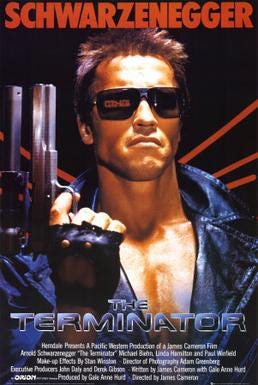I watched all six Terminator movies so you don't have to.
Come With Me If You Want To Live.

The Terminator
I watched all six Terminator movies so you don't have to. [some spoilers]
These movies have two important ideas: Time Travel and AI Foom - the AI (Artificial Intelligence) very quickly improving their own capabilities and becoming extremely powerful, once it surpasses some critical point. (See the AI-Foom Debate by Robin Hanson and Eliezer Yudkowsky)
Time travel is just silly of course, and generally is an unfortunately bolt-on (see what happened to Star Trek, e.g.). Much worse than the idea of hyperdrives. However it is necessary for Terminator (1). Nevertheless, it leads to the other movies becoming a hot mess of ret-con.
AI-Foom is a more important idea, since it could happen that a sentient AI `takes off' quickly and decides humans are a threat. (Skynet/Genisys/Legion are all versions of this in the Terminator series). Though far from #1 on my list of global problems, it's on the list.
It didn't happen in 1997, or 2003, or 2017 in our timeline, but that's due to the efforts of Sarah Connor and others to delay its emergence, at great personal sacrifice, including the death of Sarah, John, Kyle, depending on the timeline.
The question is, in a world without time travel that upends everything, how do we prevent this version of AI-Foom, the emergence of sentient evil Artificial General Intelligence, from being connected into military systems and launching rockets, given the governments we have, and their general technological ignorance?
The movies also had the opportunity to ask why Skynet saw humans as a threat, and whether humans really were worth saving, but these deeper questions are not asked. Spielberg or Lucas or Rian Johnson could have done so much better with this material.
Unfortunately, the movies don't investigate that, and instead rely on knowledge about the future, time travel, and lots of explosions to stop this. This is entertaining, but like the last 3 Star Wars movies (Ep. VII, VIII, IX), lost the deeper philosophical thread of the franchise.
Terminators 1, 2, 3, 5, and 6 are all basically the same, a Terminator is sent back in time to change the time-line and prevent Skynet (etc.) from being stopped by a plucky band of humans, usually led by John Connor (or in Dark Fate, the female protagonist, Dani Ramos)
Terminator Salvation (4) is set in the post-apocalypse (after Skynet won at the end of Rise of the Machines). Props to the creators for trying to change the formula, but mis-executed.
But it was confusing because the two main young white guys looked too similar. Christian Bale is John Connor, Sam Worthington is cyborg Marcus Wright. As Tina Turner said, "We don't need another hero". This is why females all have different hair styles or colors in movies, (as did Han Solo and Luke Skywalker) ... so the audience can tell them apart.
The Terminator movies have been steadily slipping at the Box Office since 2.
Terminator: Dark Fate (6) did badly, so much that there might not be a (7) or (8) (which seem to have been planned). This isn't surprising considering
It has a female-dominated cast in a movie aimed for 12-year old boys,
It starts off in Mexico City and in Spanish in a movie aimed for 12-year old American boys. While not as daring as the Star Wars Holiday Special, which starts off in the Wookie language for 20 minutes, Americans are allergic to subtitles.
Dark Fate has a major scene at a border crossing facility outside Laredo. It didn't make any overt political statements though it had the opportunity to.
Given it was already sacrificing core markets (12-year old boys) (as if Hollywood did not learn from the new Ghostbusters (2016) about action films and boys) it should have gone all in.
A more general problem is that the characters for John Connor and Kyle Reese are played by different actors in many of the movies. (And there was a different young Sarah Connor in the TV series and later in Terminator Genesys (5) (Lena Headey and Emilia Clarke, respectively for Game of Thrones fans) Over 35 years, some of this is inevitable, but it messes up the continuity.
Most of the films are set in California, especially Los Angeles, though some in San Francisco, and the final in Texas as well. In 1984's Terminator, the pollution was much, much worse than in Terminator 2: Judgment Day (1991). Of course post-apocalyptic California is a bit worse in other ways. The general urban landscape remains similar.
The maturation of Arnold Schwarzenegger as an actor, and the Terminator as a character is notable. From a killing machine in 1, by 2 he is a protector, and in 6 is an up-standing, humane member of his community. The other Skynet creations = increasingly sophisticated killers.
I Probably should also comment on the evolution of Sarah Connor herself. She goes from "Damsel in Distress" at the outset of Terminator 1, to being an action hero lead by the second movie and thereafter.
The evolution of technology is also notable. In Terminator, Skynet is envisioned as a mainframe, but in the later films, it is a distributed network (5), Genisys (a new global OS like Siri or Alexa) and Legion (in response to the human's attempting to nuke the mainframe) (6)
It would be nice to see a recut of the whole series reducing the nonsense, as has been done with the SW Prequels and the Hobbit.
Ranking
If you can watch only one, watch the first one. My rankings are below:
Terminator Series Ranked 1>2>6>3>5>4
Where:
The Terminator (1984)
Terminator 2 Judgment Day (1991)
Terminator 3 Rise of The Machines (2003)
Terminator Salvation (2009)
Terminator Genisys (2015)
Terminator Dark Fate (2019)
I'll be back
To be clear, I did not watch the TV series, The Sarah Connor Chronicles, though I have been advised it is good.

